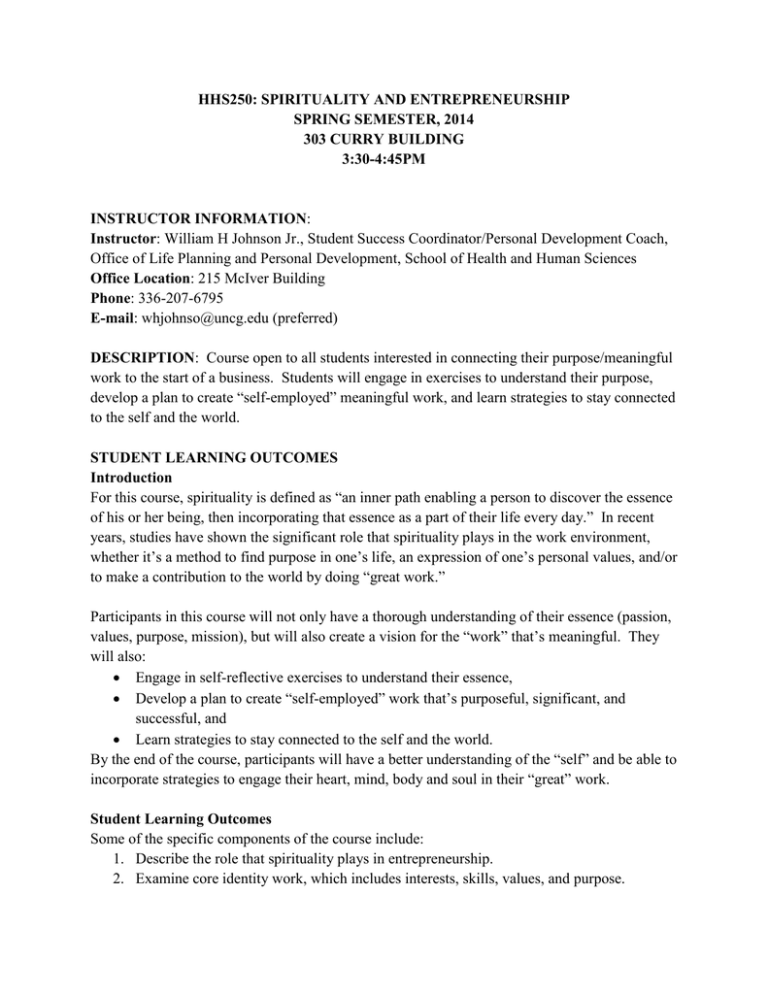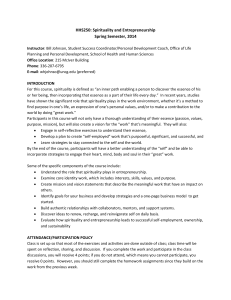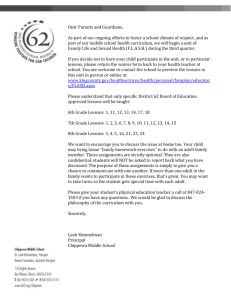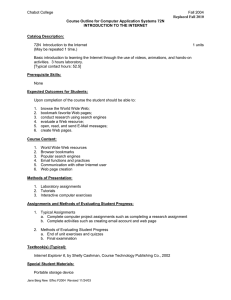HHS250: SPIRITUALITY AND ENTREPRENEURSHIP SPRING SEMESTER, 2014 303 CURRY BUILDING 3:30-4:45PM
advertisement

HHS250: SPIRITUALITY AND ENTREPRENEURSHIP SPRING SEMESTER, 2014 303 CURRY BUILDING 3:30-4:45PM INSTRUCTOR INFORMATION: Instructor: William H Johnson Jr., Student Success Coordinator/Personal Development Coach, Office of Life Planning and Personal Development, School of Health and Human Sciences Office Location: 215 McIver Building Phone: 336-207-6795 E-mail: whjohnso@uncg.edu (preferred) DESCRIPTION: Course open to all students interested in connecting their purpose/meaningful work to the start of a business. Students will engage in exercises to understand their purpose, develop a plan to create “self-employed” meaningful work, and learn strategies to stay connected to the self and the world. STUDENT LEARNING OUTCOMES Introduction For this course, spirituality is defined as “an inner path enabling a person to discover the essence of his or her being, then incorporating that essence as a part of their life every day.” In recent years, studies have shown the significant role that spirituality plays in the work environment, whether it’s a method to find purpose in one’s life, an expression of one’s personal values, and/or to make a contribution to the world by doing “great work.” Participants in this course will not only have a thorough understanding of their essence (passion, values, purpose, mission), but will also create a vision for the “work” that’s meaningful. They will also: Engage in self-reflective exercises to understand their essence, Develop a plan to create “self-employed” work that’s purposeful, significant, and successful, and Learn strategies to stay connected to the self and the world. By the end of the course, participants will have a better understanding of the “self” and be able to incorporate strategies to engage their heart, mind, body and soul in their “great” work. Student Learning Outcomes Some of the specific components of the course include: 1. Describe the role that spirituality plays in entrepreneurship. 2. Examine core identity work, which includes interests, skills, values, and purpose. 3. Create mission and vision statements that describe the meaningful work that have an impact on others. 4. Identify goals for your business and develop strategies to complete them. 5. Complete a one-page business model/plan to get started. 6. Build authentic relationships with collaborators, mentors, and support systems. 7. Discover ideas to renew, recharge, and reinvigorate self on daily basis. 8. Evaluate how spirituality and entrepreneurship leads to successful self-employment, ownership, and sustainability. EVALUATION AND GRADING The course is graded A, B, C, D, or F and uses the +/- system. Your final grade will be calculated using the following criteria: Attendance/class participation/in-class work (28 classes @ 4 points each) 112 points Homework assignments (13 assignments @ 4 points each) 52 points Business Project Paper and Presentation 36 points Total Points 200 points Your final letter grade will be based on your total points, as listed on the scale below: A+: 200 A: 190 to 199 A-: 180 to 189 B+: 173 to 179 B: 166 to 172 B-: 160 to 165 C+: 153 to 159 C: 146 to 152 C-: 140 to 145 D+: 133 to 139 D: 126 to 132 D-: 120 to 125 F: below 120 There’s no final exam and extra credit will not be given. REFERENCE TEXTS/READINGS: Although a textbook is not required for this class, the books below will be used throughout the semester to guide students in creating their own business: Beam, Lisa Sonara. (2008). The Creative Entrepreneur: A DIY Visual Guidebook for Making Business Ideas Real. Bulger, Grace. (2002). The Enlightened Entrepreneur: A Spiritual Approach to Creating and Marketing a Company. Guillebeau, Chris. (2012). The $100 Startup: Reinventing the Way You Make a Living, Do What You Love, and Create a New Future. Kelley, Tom and Kelley, David. (2013). Creative Confidence: Unleashing the Creative Potential Within Us All. Key, Stephen. (2013). One Simple Idea for Startups and Entrepreneurs: Live Your Dreams and Create Your Own Profitable Company. Morgen, Robert. (2008). The Spiritual Entrepreneur: A Step-By-Step Guide to Creating a Simple and Affordable Business that You Can Start Right Now And Make the World a Better Place. Schlesinger, Leonard A., Kiefer, Charles F., and Paul B. Brown. (2012). Just Start: Take Action, Embrace Uncertainty, Create the Future. TOPICAL OUTLINE/CALENDAR: Week 1: Introduction of Class Participants; Meditation Basics; The Spiritual Entrepreneur Mindset Week 2: Identifying Purpose and Meaningful Work; Personal Self-Assessments Values, Strengths, Interests, Skills Weeks 3 and 4: Identifying and Creating Purpose-Driven Business Creation Projects; Project Completion Worksheet Weeks 5 and 6: Design/Innovative Thinking; Creativity Exercises; Idea Generation Week 7: Creating/Testing Product/Service; Getting Your Butt in Gear Week 8: Developing One Page Business Model/Plan Week 9: Building Relationships/Creating a Tribe for Your Idea; Idea Entrepreneurs Week 10: Getting the Word Out; Marketing on a Shoestring; Using Social Media Week 11: Challenges/Obstacles/Concerns…and Solutions Week 12: The Spiritual Life of an Entrepreneur; Maintaining Love for Work; Vision for the Future Weeks 13 and 14: Business Project Presentations ACADEMIC INTEGRITY POLICY: Refer to the following URL: http://sa.uncg.edu/handbook/academic-integrity-policy/ ATTENDANCE/PARTICIPATION POLICY Class is set up so that most of the exercises and activities are done outside of class; class time will be spent on reflection, sharing, and discussion. If you complete the work and participate in the class discussions, you will receive 4 points; if you do not attend, which means you cannot participate, you receive 0 points. However, you should still complete the homework assignments since they build on the work from the previous week. HOMEWORK ASSIGNMENTS These short assignments will have you explore a particular topic about your life. They may consist of a short assessment (by hand and/or on-line), completion of a worksheet, or some creative project totally off-the-wall. You will need to bring in your “results” by next class in order to get credit for the homework assignment. Each completed assignment is worth 4 points. You will receive only 1 point for assignments turned in late. ADDITIONAL REQUIREMENTS: Daily Class Format Course structure for this class: Quiet time/breathing meditations at beginning of class Homework assignment sharing with group Overview of assignment for following day/week Quiet Time/Meditation At the beginning of class (or before we start the weekly topic), you will have an opportunity to have 5-10 minutes of quiet time/meditation time – to settle down, connect with yourself, or just relax. Please, not cell phone use at this time. If running late, please wait until quiet time is over before you enter the classroom. Business Project Paper and Presentation For the Business Project, you will create a “business” based on the things you’ve learned about yourself in class, a business based on your meaningful work. At the end of the semester, you will present your “business” to me, your fellow classmates, and a few invited guests. Businesses can take the form of a product created or service offered; ultimately, you would want this to be a business that will sustain “employment” through and after college.





